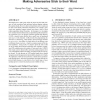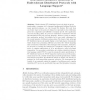148 search results - page 24 / 30 » Self-stabilization of Byzantine Protocols |
SOSP
2007
ACM
14 years 6 months ago
2007
ACM
Researchers have made great strides in improving the fault tolerance of both centralized and replicated systems against arbitrary (Byzantine) faults. However, there are hard limit...
NSDI
2008
14 years 4 days ago
2008
Much recent work on Byzantine state machine replication focuses on protocols with improved performance under benign conditions (LANs, homogeneous replicas, limited crash faults), ...
EUROSYS
2010
ACM
14 years 7 months ago
2010
ACM
Modern Byzantine fault-tolerant state machine replication (BFT) protocols involve about 20.000 lines of challenging C++ code encompassing synchronization, networking and cryptogra...
ICFEM
2009
Springer
14 years 4 months ago
2009
Springer
Fault-tolerant (FT) distributed protocols (such as group membership, consensus, etc.) represent fundamental building blocks for many practical systems, e.g., the Google File System...
ADHOC
2007
13 years 10 months ago
2007
Abstract. Many ad hoc routing algorithms rely on broadcast flooding for location discovery or, more generally, for secure routing applications. Flooding is a robust algorithm but ...


